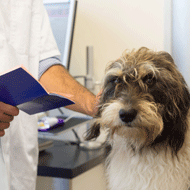Government urged to tackle puppy smuggling

MPs pointed out that Brexit offers an opportunity to change the Pet Travel Scheme.
Cross-party MPs have urged the government to do more to tackle puppy smuggling, during a debate in parliament yesterday (2 April).
Conservative MP Nigel Huddleston, who called the debate, asked the government to consider introducing on-the-spot fines for those caught illegally importing dogs, as well as improving the presence of border officials at ports.
There was much support in the House of Commons for carrying out visual checks at all hours of the day, every day of the week, as the current disparity in border presence during office hours and evenings and weekends, “can all too easily be exploited by smugglers”, Mr Huddleston added.
MPs pointed out that Brexit offers an opportunity to change the Pet Travel Scheme - reintroducing the rabies test, setting a limit on how soon after the test dogs can travel and increasing the age at which dogs can legally enter the country to, say, six months. Mr Huddleston said this would make it easier for officials to accurately assess the dog’s age and reduce the incentive to smuggle puppies, as older animals are less desirable to the public.
Some MPs also called for vehicles to be confiscated when illegally smuggled puppies are seized at the borders.
There was clear frustration in the House over delays in bringing forward new legislation to ban third party puppy sales and increase the maximum sentence for animal cruelty to five years.
Responding to the debate, animal welfare minister David Rutley said he had pledged to be a part of the Dogs Trust’s campaign to end puppy smuggling, along with 137 other MPs.
“Since my appointment as minister, it has become increasingly clear to me that we need to tackle the abhorrent puppy smuggling trade from end to end by looking at both supply and demand,” he added.
The minister confirmed that the 10-fold increase in the maximum sentence for animal cruelty would be brought forward “very shortly”. Meanwhile secondary legislation for the ban on third-party puppy sales will be laid later this spring, he added.
Mr Rutley said the government is also open to looking at the effectiveness of on-the-spot fines and 100 per cent visual checks of all dogs travelling, as well as educating the public and exploring changes to the Pet Travel Scheme after Brexit.



 RCVS Knowledge has welcomed Professor Peter Cockcroft as editor-in-chief for Veterinary Evidence.
RCVS Knowledge has welcomed Professor Peter Cockcroft as editor-in-chief for Veterinary Evidence.